
Best practice for successful sustainable tour operators
Being a sustainable tour operator is important, now more than ever. Natural disasters are multiplying throughout the world due to climate change. Travellers are increasingly looking for sustainable and responsible travel choices. Outbound travel agents and tour operators are seeking sustainable suppliers that match their own goals and visions.
Contents of this page
As an inbound tour operator, you can create positive change in your destination. You are the one operating within the country, which gives you a great understanding of local issues. These issues might be directly caused by tourism or by other stakeholders and activities outside the industry.
Tourism can mitigate negative impacts and create better places for nature and local communities to thrive if it is managed correctly. Learning from the challenges and successes of others is one of the best ways to start and improve your journey towards sustainability. This report illustrates using case studies of small and medium-sized (SME) tour operators around the world that are leading the way in sustainable development. You can learn from these businesses as you develop your own sustainable operations.
While the featured tour operators work in all areas of sustainability, each case study highlights their work within the specific topic.
For more information, read the CBI study How to be a sustainable tourism business.
1. Use the United Nations Sustainable Development Goals (SDGs)
Keeping in mind the need to meet the United Nations SDGs is a good way to measure sustainability impacts. The SDGs are a global call to action to end poverty, protect the planet and improve the lives and prospects of everyone, everywhere. In 2015, the 17 SDGs were adopted by all UN member states as part of the 2030 Agenda for Sustainable Development to deliver actions for people, the planet, prosperity, peace and partnership.
Globally, tourism has a vital role to play in contributing to these objectives. The case studies are presented, followed by the SDGs they meet.
Figure 1: SDGs
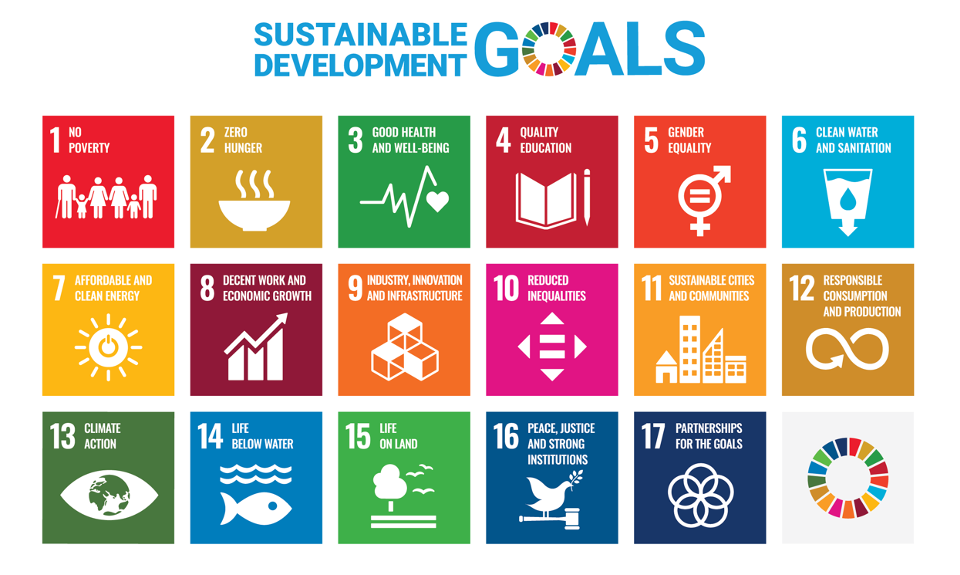
Source: SDG Action Campaign, 2024
The case studies below are organised by category: environmental management, socio-cultural preservation, economic development, business management.
2. Environmental management
The tourism industry is one of the largest global contributors to greenhouse gas emissions. This is because of travellers’ reliance on air travel and high consumption of local resources. High tourist numbers can also damage local environments and disrupt local wildlife.
But if done right, tourism can support positive impacts on the environment – for example:
- Provide jobs and generate income for local community members, reducing their need to negatively impact the local environment by e.g. cutting down trees for commercial ends or practicing unsustainable farming.
- Protect local flora and fauna through the income streams of conservation fees.
- Create more awareness amongst local communities about the need to preserve the local environment.
You can refer to the CBI study 10 tips to go green in the tourism sector for further information.
The following three case studies showcase innovative ways in which tour operators are working to conserve the environment.
Sam Veasna Conservation Tours, Cambodia
Conserving the local environment through conservation fees and local employment
Sam Veasna Conservation Tours was founded in 2006. The company’s main goal is to protect birds and wildlife species in wildlife-protected areas in Cambodia through ecotourism. Today they work with over 15 communities within protected areas. The operator employs community members as guides, cooks, housekeepers and other staff to support its operations.
All tours are focussed on wildlife and birding, and all visitors entering the protected areas pay a conservation fee of US$20 to US$40 (depending on the site). The fee goes into a village development fund that finances projects to help the community and conservation. This system ensures local communities benefit from the local environment, and they also understand the importance of looking after it.
Over the last 18 years this company has created huge benefits for the local communities and environment. These benefits get tracked – to date, nearly US$380,000 has been generated for the following:
- US$89,500 of income has been generated for the local communities
- US$29,000 has been donated towards the community and conservation funds
- US$123,300 has been invested in the development of infrastructure
- US$138,000 has been raised to directly support conservation activities
Figure 2: Clients enjoying birdwatching
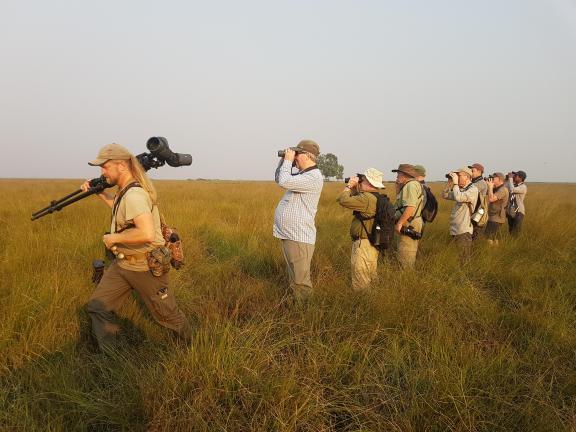
Source: Sam Veasna Conservation Tours, 2024
Sam Veasna Conservation Tours also works with non-governmental organisations (NGOs), including the Wildlife Conservation Society and IBIS Rice . Both organisations work in conservation, and some joint successes include:
- 500+ nests of threatened birds protected by local people annually in the Northern Plains, one of the most biodiverse places in Southeast Asia.
- The endangered Bengal florican has remained stable in the protected sites in which they work compared with other sites.

Arthur Sim, Business Development Manager
As a birding tour operator working country-wide in Cambodia, we are only as good as our relationships with local communities. Without their help, the giant ibis would be inaccessible in northern Cambodia, the Bengal florican would be unknown to us at sites around the Tonle Sap, the southern yellow-cheeked crested gibbon would be just a distant blur in the canopies of Keo Seima Wildlife Sanctuary. Our model ensures communities benefit from tourism directly via the supplemental income of becoming local bird guides, cooks and housekeepers.
The work of this operator contributes to the following United Nations SDGs:

Eternal Landscapes, Mongolia
Reducing the carbon footprint of tourism using measurement and reduction techniques
Eternal Landscapes is a social travel enterprise running trips for 150-200 travellers per year. Their mission is to create positive environmental and social impacts through tourism in Mongolia, rather than just financial gain.
The team at Eternal Landscapes is fully aware of the climate-related challenges, as the business is based in Mongolia, a country affected by decreasing rainfall and drought. As it operates in one of the world’s most remote countries, tourists rely heavily on flights to reach their destination. The operator believes it is their duty to take a leading role in reducing the carbon emissions connected with these trips.
To reduce emissions, they realised they would need to start by measuring and tracking process. They could not employ an external consultant to help them with this process because they had a small budget and limited staff capacity, so they signed up with Carmacal, an online carbon calculator designed directly for the tourism industry.
Carmacal measures emissions of activities like transport and accommodations However, these are only small contributors to a trip’s overall carbon emissions.
In response to these issues, the team connected with students at the Responsible Tourism Management Postgraduate programme of Leeds Beckett University, UK. Together they developed an Environmental Management Plan for the Eternal Landscapes office and a Resilience Report. This included a thorough review of the environmental impacts of Eternal Landscapes activities in the region.
Figure 3: Horse Riding Experience
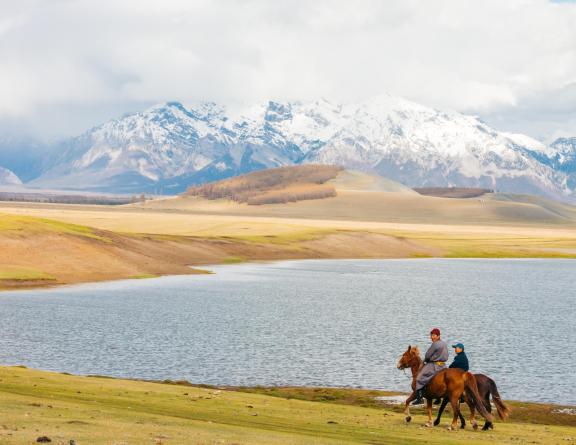
Source: Eternal Landscapes, 2024
Together they also developed a system to measure the carbon footprint of meals and specific tour activities to provide a more accurate measurement. Despite being in the early stages of their carbon measurement programme, Eternal Landscapes takes carbon measurement seriously and has demonstrated its commitment by becoming a signatory of the Glasgow Declaration on Climate Action in Tourism.
So far the team has:
- Deliberately limited the number of experiences involving internal flights. For instance, they stopped organising quick 3- or 4-day ‘highlight loops’ that involve flying between attractions.
- Prioritised designing low-carbon hiking, horse trekking, and mountain biking itineraries centred on Mongolian culture.
- Promoted use of the atmosfair index on their website and pre-departure information, enabling guests to compare the carbon emissions of international airlines flying into Mongolia.
- Limited the number of experiences they offer in ‘hotspot’ locations to prevent the creation of a popular ‘tourism circuit’ that may damage the environment and only benefit those communities.
Eternal Landscapes also forms long-term partnerships with local communities across Mongolia. This is to ensure that rural families benefit from the positive impacts of tourism. From the beginning, the company has focussed on promoting women’s empowerment initiatives, and all their guides are Mongolian women. The company also relies on male drivers who are also from the local communities. In recognition of their efforts, they were honoured with the Equality in Tourism award at ITB in 2024.

Jess Brooks, Founder
Although we’re a small company with a limited budget, we believe we can achieve the same objectives as larger international corporations, albeit with a longer timeline. What’s important is to make a start, as one advantage of our small size is our flexibility, enabling us to adapt our approach as needed along the way. We don’t pretend to get everything right, but we are committed to doing all we can to reduce our carbon footprint in a way that works well with Mongolia, with who we are and what we do, and we are committed to reducing our overall impact in a way that is meaningful rather than tick-list.
The work of this operator contributes to the following United Nations SDGs:

Global Himalayan Expedition, India
Clean energy impact expeditions encourage self-reliance for remote Himalayan communities
Global Himalayan Expedition (GHE) was started in 2013 with the intention of using tourism to support infrastructure development for remote rural communities in the Indian Himalayas. The region houses thousands of rural villages that are only accessible by foot and have no access to grid-based electricity or any basic infrastructure. GHE was founded to help bring sustainable development to remote villages. They have done this by designing ‘energy access’ expeditions. These expeditions target the adventure and expedition tourism market, whereby participants work on providing clean electricity and infrastructure for these remote villages.
Travellers hike into these remote villages, fitting villagers’ houses with solar panels and training them to maintain the solar systems. GHE conducts several expeditions a year for both corporate clients and individuals as part of a group.
The team at GHE has also supported the development of Eco homestays in these solar-powered remote villages. They identify the homestay owner first, then provide training and suitable equipment.
Figure 4: 2017 Expedition
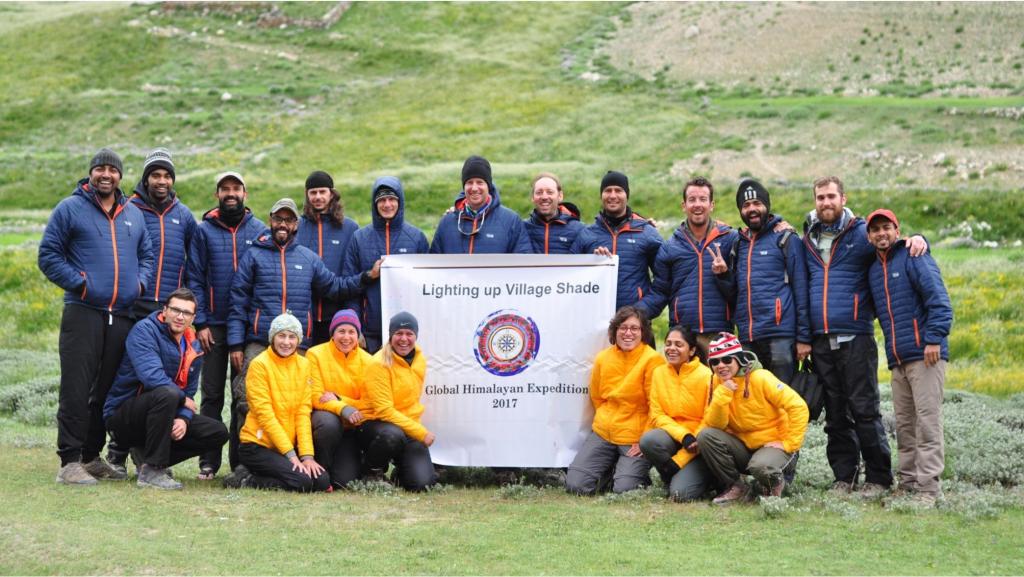
Source: GHE, 2024
Since the organisation was founded, 2,800+ travellers have taken part in expeditions. Together they have created the following positive impacts through their energy access expeditions:
- Communities empowered through impact
- Positively impacted 230,000+ lives
- Created 59 micro-enterprises
- Established 32 digital education centres in schools of remote villages
- Elimination of 726,000 tons of CO2 annually
- 236 villages now solar-powered
- Over US$159,000 generated for communities
- 138 women entrepreneurs empowered
- Over 2,300 households now carbon-neutral

Paras Loomba, Founder
Empowering remote communities through impactful travel initiatives is a dual commitment to sustainability and prosperity. By bolstering local infrastructure sustainably, these initiatives transform villages into vibrant, self-reliant destinations, curbing migration and fostering lasting prosperity. This approach not only enriches the communities but also creates a ripple effect of positive change, showcasing the transformative power of responsible travel in shaping a more equitable and sustainable future for all.
The work of this operator contributes to the following United Nations SDGs:

Other tour operators you can learn from:
SimienEcoTours is an Ethiopian-based tour operator with a vision and mission centred around responsible and sustainable tourism development in Ethiopia. The organisation works with local communities and locally owned businesses. They were also the first tour operator in Ethiopia to work on reducing the carbon footprint of their trips. They did this by reducing the number of internal flights within their itineraries.
They also introduced biking holidays, which have very little impact on the environment. These trips have become extremely popular alongside walking, hiking and other low-impact active travels.
African Scenic Safaris is a Tanzania-based tour operator that offers wildlife, climbing and trekking holidays. They run their operations with sustainability at the core and seek to reduce their environmental footprint, involving and benefitting local communities.
As part of their mission they have strict ethical guidelines for wildlife viewing, to limit the negative effects on the animals. This includes maintaining safe distances, minimising noise and disturbances, and respecting the natural behaviours of the wildlife.
Tips:
- Create an operational model that ensures communities benefit well and directly from wildlife tourism. Help them understand the benefits of conservation and protecting the local environment.
- Pick destinations that are off the beaten track, away from busy hotspot areas, to help reduce the impacts on the local environment. Target tourists looking for wilderness experiences.
- Reduce the number of internal flights that are being undertaken by guests. Market the benefits of slow travel to guests, including opportunities for taking in the scenery and immersion in the local culture.
- Introduce low-carbon tour options, including biking, hiking and other low-impact activities for soft-adventure guests to enjoy.
- Develop guidelines and codes of practice to be followed by both staff and guests, to help protect the environment.
3. Socio-cultural preservation
Tourism is one of the largest industries in the world, supporting job creation and employment opportunities. Income from tourism can provide local communities with access to better services such as healthcare, education, internet access and living spaces.
Tourism is also a big employer of women, who constitute 54% of the global workforce. However, women are generally employed in lower-skilled and lower-paid positions, so work can be done to improve this.
Additionally, tourism can:
- Help foster local pride and conserve local cultures. Tourists seek unique and authentic experiences, and learning about local cultures and customs.
- Create jobs in rural areas where other means of income are scarce.
- Reduce the number of younger generations who are moving to cities and towns to earn money.
For more information, read the CBI study 9 tips on how to become more socially responsible in the tourism sector.
The following case studies provide examples of how tour operators can work to support the socio-cultural development of destinations.
KARA-TUNGA Tours, Uganda
Preserving rural Uganda’s cultural heritage by empowering local decision-making
The Karamoja subregion endured decades of isolation and conflict that only came to an end in 2010, so it was a no-go zone for tourism until very recently. When this changed and the area in northeastern Uganda opened for visitors, Theo Vos set up a local tour operator business knowing the positive impact that tourism can provide. Kara-Tunga was developed with the vision to improve people’s livelihoods, protect biodiversity, and preserve the rich cultural heritage.
Kara-Tunga is registered as a Ugandan social enterprise. Part of the proceeds are donated to its not-for-profit Kara-Tunga Foundation. The tours have been developed in close collaboration with the host communities. All tour leaders, guides and team members are from the communities. Most are trained at the Karamoja Tourism Academy and Matany Girls’ Vocational School.
The tours incorporate visiting local museums, historical sites and farms. These tours are built to help educate tourists about the local customs and cultures of the area as well as restore the community’s sense of belonging and pride in its culture. Many community members are involved in running the tours, contributing to benefitting as many people as possible. Their involvement also includes providing accommodations and meals, teaching handicraft, guiding and many other activities.
Figure 5: Local community members
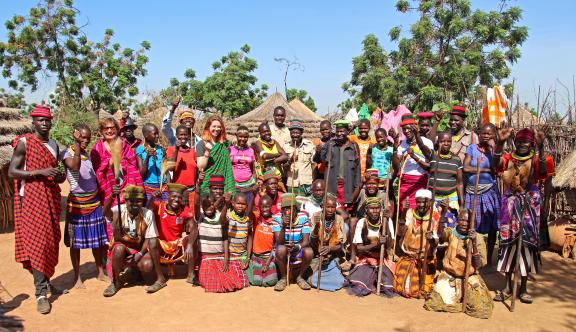
Source: Kara-Tunga, 2024
Kara-Tunga also runs eco-camps and lodges close to five key biodiversity areas in northeastern Uganda. They have been set up with a revenue-sharing model that aims to support both the sustainable development of local communities and local conservation efforts.
In 2023, 951 tourists joined community tours, contributing to the following positive impacts:
- 75 people were engaged on a permanent or temporary employment basis.
- US$14,435 was directly paid to community tourism groups and site guides for tourism activities they provided.
- 5 biodiversity hotspots were identified to empower indigenous custodians to protect their natural assets and improve livelihoods.
- 4 studies were conducted to understand biodiversity challenges and community needs, and inform effective conservation methods.
- 637 people were trained in various conservation enterprises aimed at building a brighter future.
- 102 farmers planted 51,635 trees.
- 1 honey centre was launched.

Theo Voss, Director
In conflict-stricken destinations, the indigenous communities are hungry for development but unaware of the risks of tourism. Tour operators/development partners must recognise inequality and invest in building their capacity to have a universal voice for making decisions and setting limits. We create a platform for dialogue with the host communities, as trust and frequent dialogue are key for sustainable relationships, extending to operators, agents and travellers.
The work of this operator contributes to the following United Nations SDGs:

Il Viaggio Travel, Costa Rica
Making tourism accessible and inclusive
Il Viaggio Travel, a local inbound tour operator in Costa Rica, specialises in crafting tailor-made travel experiences. Recognising the lack of opportunities for people with disabilities to travel in Costa Rica, they launched a dedicated department to cater to this niche market. Their mission is to ensure that travel within Costa Rica is accessible to everyone, regardless of disabilities.
Since the company started operating in 2012, this initiative has enabled them to buy and offer specialised equipment previously unavailable in the country. They have collaborated closely with various partners in Costa Rica to develop wheelchair-friendly trips. Their guides are trained to cater to guests with disabilities, ensuring these travellers feel supported and secure all through their holiday.
Over the years, Il Viaggio Travel has advocated for accessibility standards, influencing suppliers to adapt their products accordingly. As a result, they now offer the same Costa Rica experience to travellers with and without physical disabilities.
Figure 6: Accessible Travel
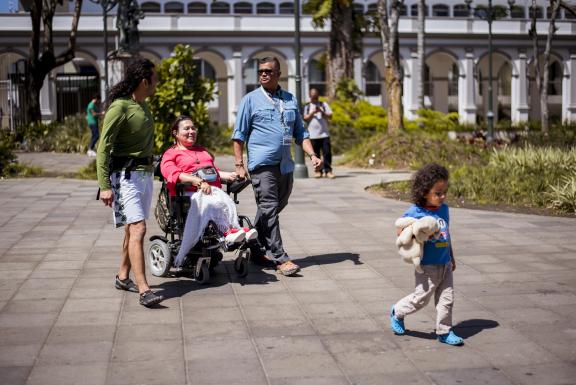
Source: Il Viaggio Travel, 2024
In 2018, Il Viaggio Travel expanded its efforts by developing itineraries tailored for individuals with autism and Down syndrome. They aim to continue this inclusive approach by introducing sensory tourism-friendly itineraries soon. Il Viaggio Travel has made its website fully accessible so that it is useable by everyone, including people with impairments and disabilities.
To further support their mission, the founders established the Costa Rica Tourism Accessible Network, a non-profit organisation collaborating with the government and various stakeholders. Their objectives include:
- Creating an accessibility country app providing accessibility information in a variety of accessible technological formats.
- Educating and certifying the tourism industry through partnerships with institutions like the university UNED.
- Verifying compliance with accessibility standards with the help of local and international experts.
- Advocating for legislation to promote accessibility in tourism.
Achievements over the years include:
- Sourcing equipment to make areas, activities and suppliers accessible.
- Assisting travellers with challenging health conditions.
- Introducing accessible vehicles and training NGO partners.
- Developing alliances for the country’s first accessibility app.
- Creating a brand of accessible clothing to support education for students with disabilities.
- Influencing the transformation of the country’s tourism plan to an inclusive one.
- Proposing legislation for the development of inclusive tourism.
Additional to their efforts around accessibility, they are working hard to reduce negative environment and social impacts. Read more about their endeavours on their Go Green webpage.
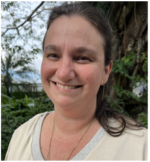
Stephanie Sheehy Protti, Founder
We recommend tour operators and tourism companies in general to begin the process of training, opening their minds, checking their facilities, services, and suppliers with regard to accessibility levels, and then gradually work towards improvement. This will lead to achieving accessible tourism, where they can enhance their services, attract more clientele, and consequently increase their economic revenue. By doing so, they will feel increasingly satisfied and fulfilled with their social responsibility efforts.
The work of this operator contributes to the following United Nations SDGs:

Matoke Tours Africa, Uganda
Empowering women to become driver guides
Matoke Tours has been operating in Uganda since 2007. In 2019 they launched their Women Only Group Tour, which involved all female-owned accommodation providers, rangers, and activity providers. When planning for this tour they realised that there was only one option for a female driver guide. Matoke Tours is one of the top-3 tour operators in Uganda, with a large network of suppliers. They felt it was their duty to respond to the lack of female guides and create access for more women to become tour guides, plus ensure safe working conditions for them.
The operator piloted a Female Tour Guide training programme in cooperation with a tourism and hospitality training provider, Ukarimu. With 34 participants having completed the programme, it is a success.
In 2023 they organised their first Leadership Bootcamp for women in tourism. They invited a group of women (guides, tour operators and lodge owners) for a 2-day bootcamp at Lake Mburo National Park. The idea was to create a safe space where participants could share their experiences, discuss challenges and form mentorships. It was so successful that they plan to organise these on a yearly basis from 2024. At the same time, they continue to operate the women-only tours. This has helped increase the number of opportunities that are available for these newly trained guides.
Figure 7: Female tour guide bootcamp
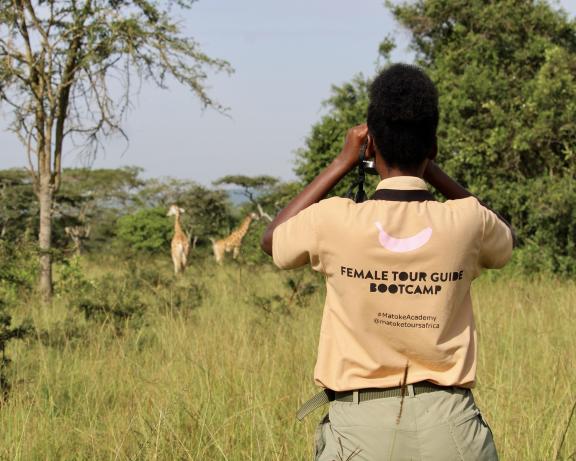
Source: Matoke Tours, 2024
Through these initiatives Matoke Tours has:
- created more visibility for female role models and leaders in the tourism industry.
- trained 34 young women to take the step towards becoming a driver guide.
- increased conversation around the roles of women in society.
- increased female voices and created a safe space for women to contribute to the development of the tourism industry.
Additionally, in 2022 they received the Akula Tourism Award for being the ‘Most Sustainable Tour Operator’ in Uganda in recognition of all their hard work and effort in building a sustainable tourism industry. They also received the ‘Uganda Wildlife Authority Award’ in 2023 in appreciation of their support towards wildlife conservation.

Anna Grodzki, Managing Director
On my journey, I have learned how important it is to always start by intentionally listening. It’s crucial to create a safe space for women to discuss challenges and experiences and to share about their needs and ambitions. Based on these conversations, we can identify the best ways to support, factoring in the capacity and resources available to us. It can feel daunting to tackle a complex topic like gender equality, but we can start with small steps and accept that we will still have to learn in the process. Hopefully, along the way we will inspire others to join our movement and create impactful change.
The work of this operator contributes to the following United Nations SDGs:

Other tour operators you can learn from:
Mater Sustentable is an Argentinian tour operator that was founded in 2014 with the dream that ‘tourism can be an opportunity to value local culture, community and respect for the environment’. They develop their tours and itineraries by collaborating with NGOs, institutions, social groups and community-based programmes.
While the organisation has developed and undergone a variety of initiatives, one that stands out is their work during the Covid-19 pandemic. While tourism was at a standstill, Mater Sustentable used the time to work with and train local communities on developing experiences and projects that could become part of their supply chain. They did this by sending out their travel agents, who would usually be selling holidays, into the field for capacity-building workshops and training.
Tips:
- Support local capacity-building by developing tourism products and experiences alongside local communities to give them ownership.
- Train your team on accessibility issues. Work with your supply chain to build accessible routes and tours to help cater for this market.
- Listen to communities’ needs before acting and developing initiatives to support them.
- Take small initial steps when supporting local social issues. Do not rush into anything with big actions. This will help you discover what works and what does not work.
4. Economic development
Providing economic opportunities for local businesses and communities is at the heart of being a sustainable tourism business. Tourism is a huge contributor to ‘economic leakage’, where tourist spending goes to large international companies and very little stays in the country to benefit local businesses and people.
Locally managed and community-based tourism initiatives can help to:
- Reduce leakage and create local benefit from inbound tourism.
- Provide a steady income or additional means of income for local communities.
- Support initiatives that include paying fair wages, using local suppliers and employing local people.
The following three case studies provide insight on how tour operators have approached this and are supporting the economic development of their destinations.
Adventures With Colby, Malawi
Locally managed campsites offer community experiences in remote areas in Malawi
Adventures with Colby is a local tour operator based in Malawi that sells tours to the European market. It was founded in 2017, aiming to promote Malawi’s abundant wildlife and varied landscape plus provide adventure tourism opportunities and leisure activities.
To support local tourism development and sustainability, they have begun to develop community-owned campsites across Malawi. This initiative was developed in partnership with GIZ (Deutsche Gesellschaft für Internationale Zusammenarbeit), a German sustainable development organisation.
Figure 8: Cultural experience
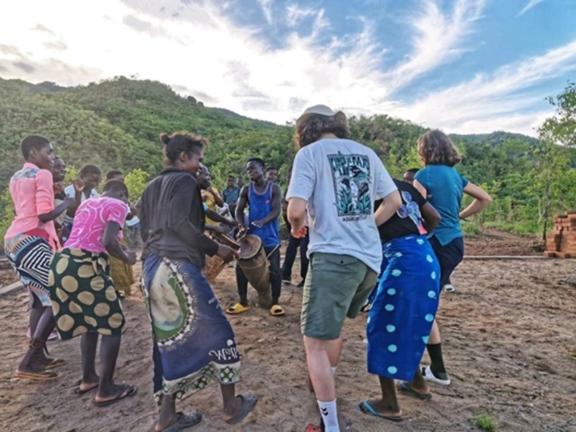
Source: Adventures with Colby
The campsites are managed entirely by community members and staffed by guides, porters, artisans and food producers, who are all trained. Adventures with Colby supervised the training of local guides and artisans in the area, with funding provided by GIZ. The locations selected for development already had existing artisans and a team of local guides trained by Malawi Tourism. In collaboration with the community, the campsite team further trained additional porters and guides to enhance the services offered along the trail. Additionally, the communities along the trail are responsible for preparing food for tourists and adding a personalised touch to the overall experience.
This initiative has been running for three years (2021-2024) and has created the following impact:
- Four campsites have been developed in rural sites in Malawi.
- 3000+ jobs were created, with local community members hired or employed as carpenters, builders, site supervisors, team leaders, casual labourers (water drawers, assistant builders) and roof thatchers.
Additional to the campsite development project, they have also supported local residents who are often rural, poor and economically marginalised, through mental health support in schools and the communities.

Colby Mughogho, Business Manager
We believe that companies, doing business in a responsible and sustainable way, can help raise the quality of life and standards of living for people in some of the poorest parts of the world.
The work of this operator contributes to the following United Nations SDGs:

Alternative Peru, Peru
Successful community cultural tourism attracts socially conscious travellers
The tourism scene in Peru is extremely uneven. Major sites like Machu Picchu are very busy, while other places barely see any tourists at all. This has created a very unfair spread of the benefits of tourism. Additionally, in rural areas communities are losing their cultural traditions, as farming practices are changing and young adults leave home to find work in cities.
In reaction to this, Alternative Peru was launched to help spread the benefits of tourism and provide income for communities that will help keep young people at home and preserve their culture. Since the very beginning they have worked closely with locals, and consider them as equal partners in the projects. Local communities are also involved in all the decision-making, which helps the team develop tours in a responsible way that does not exploit the culture.
Alternative Peru focusses 100% on responsible and sustainable tourism. They are a registered BIC (Company for the Collective Benefit and Interest), with the purpose of creating positive social, economic and environmental value in the communities they visit and work with.
Figure 9: Cooking class
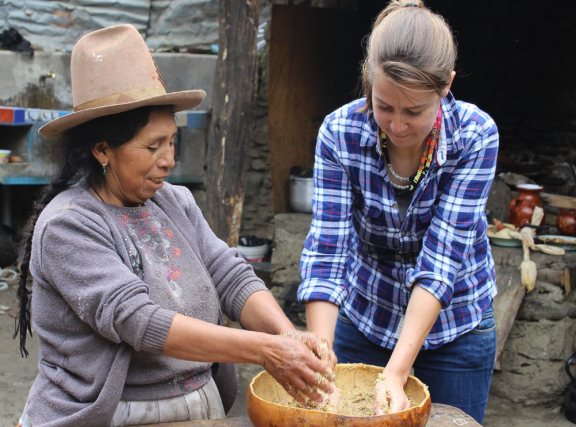
Source: Alternative Peru, 2024
Activities are focussed on showcasing local culture and traditions: visitors can participate in workshops on traditional architecture or agriculture, handicrafts, local food and cooking habits. The income from these tours, alongside the pride that comes with showcasing them to interested travellers, helps preserve local cultural values.
Through their work, they have created the following positive impacts:
- Provided income to some of the most rural and vulnerable people.
- Helped conserve the natural environment through alternative income streams for communities.
- Increased awareness of the need to travel responsibly and visit more destinations off the beaten track.
- Employ only local Peruvians. Current staff count are 48 independent guides and 180 casual workers, including cooks, drivers, cleaners and artisans.
- Approximately 90% of the income generated goes directly to the 24 communities they work with.
- Support for 14 social projects and NGOs.
- Indirectly they estimate that their work positively impacts more than 5,000 people, mostly from indigenous communities.
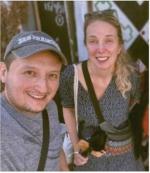
Alfredo Bendezu, Co-Owner and Manager, and Natalie Lefevre, Founder and Co-Owner
A local tour operator’s success depends largely on your ability to contribute to the success of the communities. Focus on their sustainable development and always see them as partners, work together with them to create experiences, and make them truly feel involved not only in the operations but also in the planning phase. This will make the experience better for everyone and therefore responsible, and socially conscious travellers will be naturally attracted to your company, which will enhance your positive footprint and guarantee you the best reviews and highly reliable and effective word of mouth.
The work of this operator contributes to the following United Nations SDGs:

Fernweh Fair Travel, India
Uplifting rural communities through income generation and female empowerment
In the remote villages of the Indian Himalayas there are issues around domestic violence, and the area is home to many young widows. In 2005, a shelter was opened to provide support for these victims. Founder Poonam decided to develop tourism activities in the area when it became clear that the shelter was not providing enough support for these women. Tourism would provide jobs and contribute to upskill these women, giving them a purpose and helping them to provide for their families.
Figure 10: Community experience
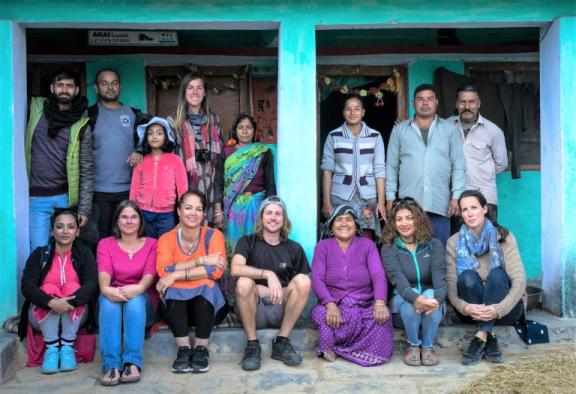
Source: Fernweh Fair Travel, 2024
Poonam began speaking directly with the local communities, understanding the importance of including them within the planning process. These discussions helped open a conversation around what type of tourism should be developed and what experiences they would like to create for visitors. Once this was agreed on, training and skills development programmes were provided for all those wanting to get involved.
Amongst the positive outcomes these initiatives have yielded within the communities:
- 507 women supported through e.g. education, employment and shelter.
- 50 local men and families work directly and/or indirectly with Fernweh.
- Support provided to locals in building, setting up and marketing their homestays.
- Opportunities created for handcrafters and makers of handmade organic products.

Poonam Rawat-Hahne, Founder
Engaging local communities in tourism planning is about more than just inclusion, it is about acknowledging their invaluable skills in maintaining culture, protecting the environment, and developing authentic experiences. Their involvement is not optional, it is essential for long-term and enriching sustainable tourism development.
The work of this operator contributes to the following United Nations SDGs:

5. Business management
This section shows how tourism businesses are adapting to operate sustainably and avoid greenwashing. Greenwashing is the act of making false or misleading statements about the environmental and social benefits of a product or practice.
Applying for a sustainable certification is a clear way that businesses can work towards and prove their sustainability practices in a transparent way. Though it is a big commitment for a small tour operator, certification supports businesses to fully understand their operations, avoid greenwashing and make improvements where needed. The main certifications available for tour operators globally are Travelife for Tour Operators, TourCert and Good Travel Seal.
Being collaborative and sharing good practices is important. Tour operators should aim to work together when striving to be more sustainable.
The following three case studies illustrate how businesses have adapted their operations and management.
Gassy Tour, Madagascar
Management and employee commitment to achieving sustainable tourism certification
Gassy Tour is an inbound tour operator in Madagascar focusing on community and village tourism. In 2016 they started a sustainability certification journey to improve their sustainable operations and provide both clients and partners with hard evidence of their sustainability practices. They chose Travelife for Tour Operators sustainable tourism certification, which they were issued in 2018.
The process of becoming certified was time-consuming and took the team almost two years. All team members were involved in the process with Philippe, the General Manager, leading the way. They estimated that if one person had been working on the certification full-time it would have taken up 6-7 months. In March 2024 they were presented with their renewed certification on stage at ITB Berlin.
Figure 11: ITB Awards
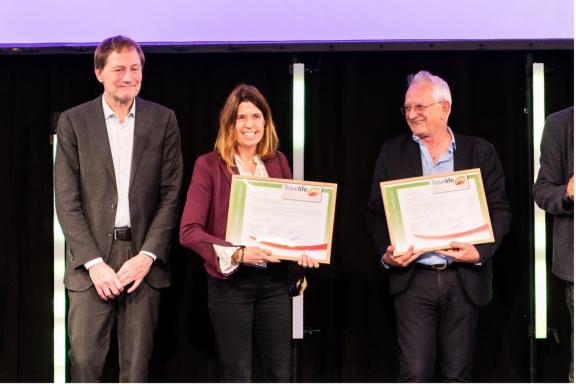
Source: Gassy Tour, 2024
Going through the certification process supported them in making the following operational and purchasing changes:
- Introduction of eco-responsible purchasing at the office and for customers.
- Installation of a sorting bin at the office and drop-off waste at a collection point that transforms it into eco-responsible bags.
- Providing guests with reusable water bottles to replace single-use plastic ones.
- Distribution of specific sustainable tour codes of conduct for their local guides and tour partners in Madagascar.
- Development of a sustainable good practice guide for hotels.
Even though it was a lengthy process, they have seen many benefits:
- Building better relationships with their tour operator partners in Europe. More tour operators are requesting information around their supplier’s sustainability credentials, and they can now provide this evidence while avoiding greenwashing.
- Improving employee awareness and interest in sustainable development because the entire team was involved in the process.
- Helping the team reevaluate its operations and develop sustainability throughout.

Philippe Frappat, General Manager
A few things to consider before starting your journey with certification: firstly, the management must be personally convinced that sustainability is necessary, not only for their company but also for their country. Next, management must present this new objective of achieving certification to the employees, making sure that everybody understands this objective and is committed to supporting it. Everyone must be aware that the journey will be a long one and sometimes a difficult one. But at the end it is worth all the hard work, as the positive impact of the change certification brings with it is amazing.
The work of this operator contributes to the following United Nations SDGs:

Sejiva, Indonesia
Increasing positive impact tourism through collaboration and reinvestment
Sejiva is a collaboration between three tour operators: Wise Steps Travel, Sebumi and Traval (which has since shut down). Each of these companies were operating separately with a vision of making travel a positive force for good in Indonesia and beyond. They believed that through a successful partnership they could work together, share best practices, and make an even bigger impact.
Together they have co-created extraordinary experiences, enabling travellers to take part in regenerative activities that empower local communities and learn from the community’s wisdom. At the same time, travellers are encouraged to reconnect with nature and restore Indonesia’s incredible ecosystem.
Figure 12: Tree planting
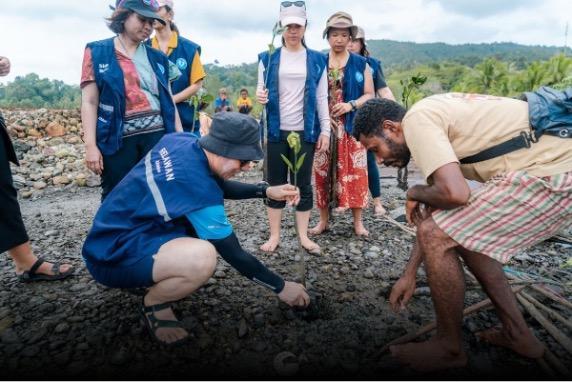
Source: Sejiva, 2024
This rather new this collaboration (started in 2024) aspires to the following:
- Build a community of industry leaders and travellers with a joint vision around sustainable tourism.
- Design experiences that reduce carbon footprints, do not rely on plastic items, and support local communities.
- Support local projects, including regenerative farming, reforestation and coral rehabilitation.
The geography of Indonesia often requires domestic flights. Sejiva tries to reduce emissions by designing itineraries more efficiently, using eco-friendly accommodations and making internal operations more efficient. They measure all remaining CO2 emissions and offset them by supporting a local organisation that has a focus on restoring local ecosystems.
At the end of 2024 they will publish a transparent impact report highlighting the work the new collaboration is doing and listing improvement goals set for the future.

Matteo Bierschneider, Co-Founder
We were lucky to survive the pandemic. It allowed us to rethink what we want to achieve. We, the three founders of Sejiva, met on a remote island and discussed how we can create a real impact over the next few years. The only way forward was collaboration. After aligning our interests, Sejiva was born; it means ‘one soul’ and symbolises our common goal to change travel. We are designing meaningful experiences for travellers, organisations and educational institutions, and reinvest part of our profits in local projects. Over the next 5 years we plan to co-create regenerative educational centres that will serve local communities and offer immersive experiences.
The work of this operator contributes to the following United Nations SDGs:

Jordan Geography, Jordan
Gaining sustainability certification builds stronger relationships with clients
Jordan Geography was established in 2018 by experts in the Jordanian tourism industry with a combined expertise of 30+ years. From the start they built their operations with sustainability at the core of their business. They have been a Travelife Partner since 2018 – partner status shows their commitment to sustainability but does not serve as a certification itself.
In 2021 the operator applied to take part in a new CBI project centred around sustainable development of the Jordanian tourism industry. Keen to continue their sustainability journey, they were delighted to be selected, along with 12 others. The project supported tour operators to become Travelife-certified, with funding, training and other external support.
In 2023 Jordan Geography was the first tour operator in Jordan to become Travelife-certified. The process was time-consuming and lengthy, but one that they feel has produced great impact on the team and the organisation as a whole.
Figure 13: Travelife Awards
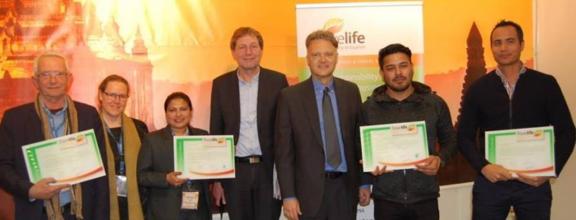
Source: Jordan Geography, 2024
Being part of the project and becoming certified has:
- helped them with tips and processes on how to implement sustainability throughout their operations.
- supported them to speak about their sustainability on their website, in their marketing materials and in communications with their suppliers.
- created a network of sustainability focused on tourism businesses, helping to share best practices and support each other.
- created more interest from outbound tour operators and clients, helping to increase their sales and build better relationships throughout their supply chain.

Ahmed Q, Inbound and Sustainability Manager
Even though we were already on our sustainability pathway, being part of the CBI project helped us to accelerate our journey. I would highly recommend tour operators to look out for donor-funded projects like the one in Jordan and jump on the opportunity. The journey has helped the whole team delve deeper with their understanding of sustainability. And being certified has enabled us to build better relationships with clients and stand out from others, especially with the European outbound market. We did not understand the growing importance of sustainability for European tour operators, however our experience at ITB Berlin 2024 really highlighted this. It gave us a good starting point for conversation and helped us to build better relationships.
The work of this operator contributes to the following United Nations SDGs:

Other tour operators you can learn from:
Aarya Village Travel in Nepal is a local tour operator that focuses on visiting off-the-beaten-track destinations and involving locally owned businesses within their supply chain. Their mission is ‘to inform, inspire, and entertain travellers on the pillars of experiential regenerative tourism’. In 2022 the operator was bestowed the Local Hero Award for their efforts in Nepal.
The tour operator has been working with Evaneos, an online travel agency (OTA) specialised in selling sustainable holidays. Evaneos works with and supports its local tour operator partners through sustainability training and certification.
Tripseed is a new tour operator in Thailand that was born out of the Covid-19 pandemic with the knowledge that tourism needed to be made more sustainable in the country. The organisation is working to measure and reduce the carbon emissions of their tours and operations alongside running various initiatives.
To support their journey Tripseed has joined different networks that are geared towards supporting tour operators on their journeys. Their memberships include the Global Collective for Travel, the Glasgow Declaration and Tourism Declares.
Teyuna Tours is a small tour operator based in northern Colombia. Their main experience is The Lost City Trek, which takes tourists into the Sierra Nevada National Park to visit the amazing Lost City. Their whole ethos is around sustainable tourism and they began working towards certification from the beginning.
They believed that speaking about sustainability commitments without certification opens the door to accusations of greenwashing. They chose TourCert – Travel For Tomorrow certification by undertaking research with their customer base to understand which certification was most familiar amongst their clients.
Tips:
- Involve and educate your whole team on the importance of sustainability, otherwise it will be difficult to drive the work forward. An important aspect to consider is the market demand for sustainable products and how your initiatives will increase bookings and attract different markets.
- Seek out local collaborative opportunities to support your work and share and learn from others. Sustainability should not be a competition. This may also include joining networks and associations.
- Look out for and work with partners (suppliers, outbound tour operators and OTAs) who share the same sustainable vision and mission.
Acorn Tourism Consulting Limited carried out this study on behalf of CBI.
Please review our market information disclaimer.
Search
Enter search terms to find market research